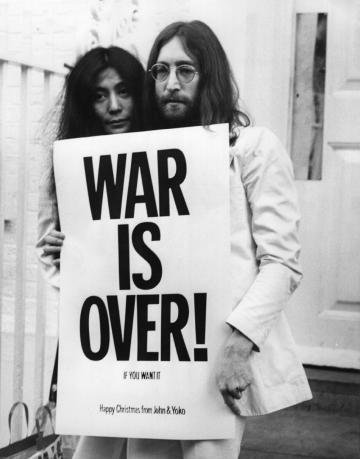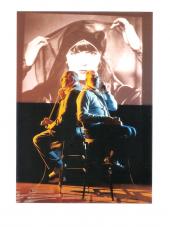'The U.S. vs. John Lennon'
The Dixie Chicks' difficulties pale in comparison with John Lennon's. The man quoted (incorrectly) as saying the Beatles were more popular than Jesus caused an international uproar thereby.
Years of such brouhahas and 24/7 media coverage gave him the false sense that he could say anything he wanted with the Anglo-American impunity of free speech.
"The U.S. vs. John Lennon" is an excellent documentary reminder of how wrong he was, how musically brilliant he was, how politically powerful he and the Vietnam anti-war movement were, and how ferociously our government counterattacked.
Everybody's present and accounted for here: John and Yoko Ono, Strom Thurmond and J. Edgar Hoover, Abbie Hoffman and Jerry Rubin, George McGovern and Gore Vidal, G. Gordon Liddy and Angela Davis, Walter Cronkite and Dickie Smothers. Co-directors David Leaf and John Scheinfeld have rounded them all up -- dead or alive.
There's no doubt about anyone's point of view, including Leaf's and Scheinfeld's, but "U.S. vs. Lennon" is not a Michael Moore rant. It is, rather, a carefully extracted and constructed historical account with a fascinating assemblage of then-and-now interview footage, peppered by vintage news clips, showing how very different this rebellious Liverpudlian was from the other three-quarters of his Fab Four.
Our revolutionary peacenik's legal trouble began in earnest when his and Yoko's infamous weeklong "sleep-in for peace" (among other publicity stunts) produced public support and opposition -- plus a media circus -- beyond their imaginings.
Lennon's radicalization was heightened by his alignment with the Black Panthers and manipulated by Rubin and Hoffman to fuel the movement. Last straw for the paranoid Jedgar and Richard Nixon was Lennon's dynamic concert appearance on behalf of Detroit pothead John Sinclair (sentenced to 10 years for having two joints).
That footage, and the "10 for 2" song he wrote and sings in it, is perhaps the film's most riveting moment, along with his hilarious encounter with a condescending New York Times reporter in her office.
The technical basis for Lennon's deportation proceedings was his conviction for possession of "dangerous drugs" -- read: small quantity of marijuana -- in England years earlier. The real reason was the anti-war voice that he and his celebrity supplied in general, his "Give Peace a Chance" anthem in particular.
The CIA's illegal COINTELPRO domestic spying operation during the Nixon administration invites obvious comparisons with the warrantless wiretapping et al. dubious wartime practices in the name of "national security" today. At the heart of both is authoritarian secrecy and the cynical knowledge that, if and when such operations are "outed," the snail's pace of legal challenges will take years to stop the abuses.
Whether you love or hate or don't know Lennon -- whether you miss him (as I do) or not -- you should see this hugely informative film.
P.S. And guess what? Twenty-four years later, the government is still thwarting the Freedom of Information battle for release of the final 10 controversial documents in the FBI's Lennon-surveillance files.
La plus ca change, la plus c'est la meme chose: A quarter-century after his murder, the U.S. government is still afraid of John Lennon. John would enjoy the bitterly delicious irony of that. He is resting in peace, and they're still not giving it a chance.






